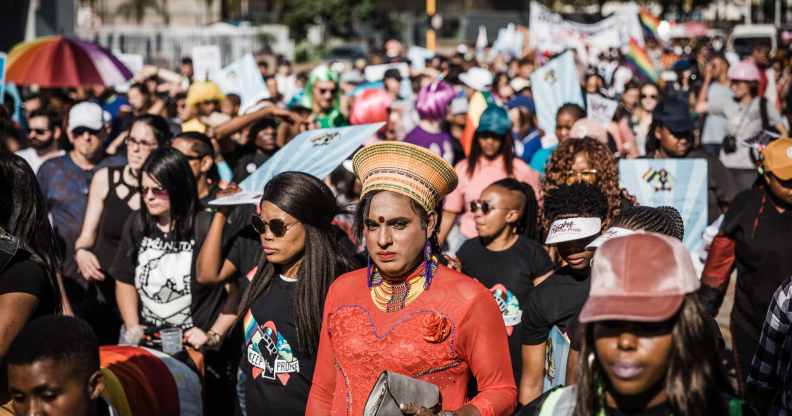South Africa to introduce third gender option on national IDs

Members of the LGBT+ community march in the Pride parade in Durban, South Africa, in 2018. (AFP via Getty/ RAJESH JANTILAL)
South Africa’s government has committed to offering a third gender option on national identity documents to better “accomodate” non-binary people.
Every South African is assigned a 13-digit national ID number at birth, a system that was introduced during Apartheid when the number indicated a person’s race to decide how they would be treated by the state.
The code, which no longer indicates race, still gives details on the individual’s date of birth, citizenship status and gender. The are only two options for the code for gender: male and female.
National ID numbers are used for everything in South Africa, from voter registration, to applying for a passport, to opening a bank account.
According to Quartz Africa, around 530,000 South African people identify as non-binary, and have been left without accurate identification.
But the country’s Department of Home Affairs is now planning a consultation with the LGBT+ community to change that.
Sihle Mthiyane, head of policy and strategy at the Department of Home Affairs has confirmed: “The identity number will change to accommodate the LGBTIQ community.”
In December, 2020, the government published a document on how the country could amend the system, in which is said: “While South Africa has made great strides towards ensuring that no one who lives in the country is left without a legal record of existence, there are still people (including citizens) who remain either undocumented or improperly documented.
“This group includes non-binary persons… The seventh digit of the ID number is a gender marker that indicates whether the ID holder is a female or a male – (0-4 means the holder of the ID is a female while 5-9 means the holder of the ID is a male).
“This is the most contentious digit for non-binary or transgender persons as it does not reflect their sexual orientation or gender.
“To accommodate non-binary, transgender and intersex persons, it is recommended that an alternative digit or letter ‘X’ be used for this population.”

